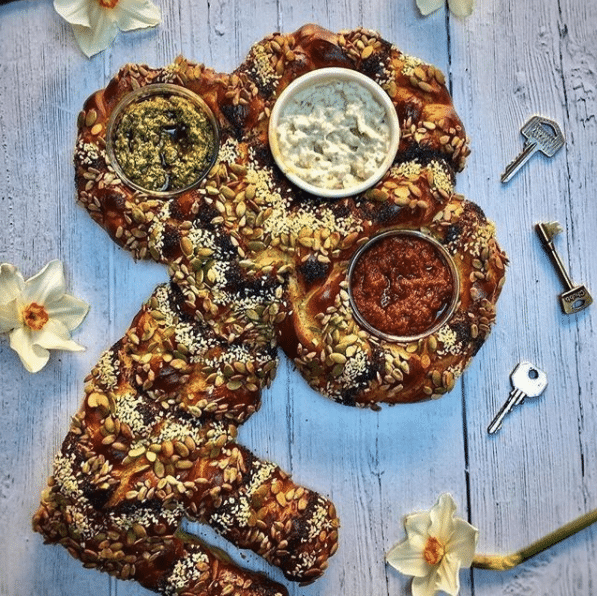
What is shlissel challah? In case you haven’t reached the lesson in Duolingo yet, “shlissel” is the yiddish word for key and baking challahs in this unique shape has long been an Ashkenazi Jewish tradition.
Though we do not know exactly when this tradition originated, in recent years the custom has become common practice in many Jewish homes across the globe on the Shabbat following Passover.
The unique key shaped challah symbolizes the opening of the gates to heaven and the belief that our livelihood is in God’s hands. The tradition also holds in some regions that bakers should sprinkle sesame seeds on top of the dough to represent when mahn (manna) fell from the sky to sustain the Jews while on their way to the Promised Land.
This belief evolved into “segulah for Parnassah,” an omen for good fortune— bake a shlissel challah after Passover and unlock financial security for your family!
Different kinds of shlissel challah
There are many ways to bake shlissel challah, including some recipes with a bit more iron than you might have been expecting. While some bakers simply form their challot into the shape of a key, others braid their challah normally and then press a large metal key into the middle of the dough.
Why is there a whole week dedicated to it?
The baking of shlissel challah traditionally takes place before the Shabbat immediately following Passover so TECHNICALLY we should really be calling it shlissel challah Friday. However, since Passover ends on a different day of the week each year, sometimes the whole week in between the two holidays can end up being just a few days.
Criticism
Some Jews believe that this tradition encourages the community to believe in spiritual shortcuts instead of actually taking the time to pray to God. From this view, introducing too many trendy and cute traditions into Judaism dilutes its historical and religious significance, potentially delegitimizing Judaism as an overall concept and pushing our culture to be more secular than religious.
On keys, doors, and shlisel challah. pic.twitter.com/NePoNmwmMo
— D Bash (@DBashIdeas) April 8, 2021
Additionally, there is an argument that shlissel challah actually originates from Christian/Pagan traditions as keys were typically formed in the shape of a cross, and during Easter (which usually occurs around the same time as Passover), there is a tradition of baking bread to symbolize the rising of Jesus.
Can't help myself. pic.twitter.com/glcbwVp1Ga
— Johnny “I got my 💉” Kunza (@johnkunza) April 8, 2021
Originally Published Apr 9, 2021 12:03AM EDT


